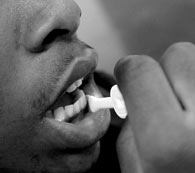A lot of gay guys make quick (and often irrational and incorrect) assumptions about their partner's HIV sero-status in the heat of the moment. "Oh, look, he lets me fuck him, he does not say anything about condoms, he is probably positive, just like me", thinks the horny top. The horny bottom thinks: "Oh, look, he does not grab condoms or lube, he is probably negative, like me, otherwise he would not be this irresponsible."

A few minutes later, in a dark corner of the sauna, the Human Immunodeficiency Virus has found new lebensraum.
Bingo!
In a city where 1 in 20 (Singapore, Beijing, Ho Chi Minh), 1 in 12 (Hanoi), 1 in 10 (Phnom Penh), 1 in 5 (Chiang Mai) or 1 in 3 (Yangon, Bangkok) gay men are infected with HIV, it is important to ditch such assumptions. It is important to stop ignoring HIV as 'a problem affecting others'.
Everybody who has ever had anal sex without a condom, or has had any form of condom slippage or breakage 'accident' with somebody else of whom we don't know his HIV status has, in principle, a chance to be infected.
Yes, that means YOU. Yes, it means ME. It means all of us.
One of my friends, who is a sauna and sex-party-enthusiast, sometimes gets so drunk and high on drugs that he does not really remember what happened exactly during his long passionate nights of action. When I ask him whether he has considered getting tested for HIV, he replied: "Why should I get tested? What is the point? If I am infected, I am probably infected already anyway. I will find out sooner rather than later. I prefer later, so that I can lead a normal life up until then."
Hmmm. A normal life... Meaning, in his case, that he does not need to feel guilty about having sex without condoms, as he "officially" is not aware that he might be infecting others. He reasons that if you know your status and you are HIV positive - well - it becomes much harder to justify ditching condoms, as he would feel guilty about infecting others. Another friend of mine who found out he was positive at the age of 19 refused to have any sex for nearly a year, for fear of infecting his lovers. He was depressed and could not sleep for months; any little itch or tiny cough triggered panic and alarm. Meanwhile, he kept his infection a secret from his family and most friends, leading a double life.
So why should you get tested for HIV? Why would you want to know you have a deadly disease and destroy your love life? Why face possible discrimination and stigma from friends, family and at work? Why not rather just 'let it be'?

In fact, there are several good reasons to get tested. I list a few of them below.
The first reason is perhaps partly a philosophical reason. I believe it is our duty, as the only animals on the planet who have brains that are able to reason, to get to know ourselves. Knowing ourselves and developing our personalities, talents and skills, and plan our lives based on what we learn is part of what makes life worth living. Taking stock of our lives, and taking RESPONSIBILITY for what we have done, is part of our value as human beings. Ignoring the possibility we might have HIV, which can, if untreated, be an important threat to our personal existence is, well, for lack of a more diplomatic term, rather stupid. It is also selfish versus others whom we may unwittingly infect (see below).
The second reason is biological / medical. If we are infected with HIV, our immune system is gradually destroyed. This takes, depending on each individual, between one and 20 years; fifty percent dies within 10 years. Unless we start treatment with antiretroviral medicines. These used to be terribly expensive and full of side effects, but are now quite affordable and less toxic. One used to take 6-8 pills a day in the past, but now many have been combined in convenient once- or twice-a-day doses. These pills used to have nasty side-effects, but these have decreased too, for most people at least.
Studies have shown that the earlier we find out that we have HIV and the timelier we start treatment of HIV with antiretroviral medicines, the more likely it is that our immune system will recover and the less likely it is that we will experience some of the nastier manifestations of AIDS later in life - in short, the sooner you find out, the more likely it is that you can start treatment at the right moment and live a long and healthy life.
The third reason is epidemiological. If all gay men were tested and if all of those who need treatment with antiretroviral medicines would enroll in treatment programs, the average HIV viral load in the gay community would decrease dramatically. This in itself would reduce the further transmission of HIV in our communities, even if condom use levels remained the same. Increased awareness of HIV will also likely lead to increased condom use in the community. Both of these factors - reduced viral load and increased condom use - will help turn the epidemic around.
The fourth reason is life-style related. In the 1980s and early 1990s, HIV was a death sentence. But in the days of antiretroviral drugs, there IS life after a diagnosis with HIV. Some people have been on drugs for a long time and have lived with HIV for over 20 years and are still going strong. Many friends who are positive report that they are more self-aware since becoming infected, have taken on a more healthy lifestyle, with more sports, healthier foods, more holidays and relaxation. They are more thankful to be alive, and more able to enjoy life 'day by day.' They would rather be negative, still, but the quality of their life is excellent - in some cases perhaps better than before. Most importantly, they have shaken off the lingering doubts and fears that they MIGHT be infected; the nightmares and fears - knowing their positive status was for many a relief.
The fifth reason to get tested is ethical / social. People who know they are HIV positive are probably more likely to use condoms consistently. I think it is not ethical to expose yourself, or expose others to HIV. For me it is also unethical if you infect others as a result of refusing to learn your own HIV status. I think that having sex without condoms is fine under certain circumstances, but only if we are as sure as we possibly can be that we do not aid the transmission of HIV. This means: guys who are positive should make sure they do not have unprotected anal sex with guys who are negative. Guys who are not sure if they are positive (which is, in most cities, between half and two thirds of us!) should, as a precaution, assume that they are. And if they want to have unprotected anal sex with a loved one - they should get tested first. And so should their loved one. How is that for an incentive to get tested!
In the example I used in the first paragraph of this column, both partners know their sero-status - but they do not communicate about it. This shows that no matter how well we promote HIV testing, we also need to promote communication and negotiation skills in gay communities...
Have I convinced you yet? If so, here is a little warning note! When you get tested, be sure that the clinic you go to is confidential and anonymous. You don't want the clinic to report your name and address to whatever authorities that may cause trouble. In most Asian cities there are Voluntary Counseling and Testing (VCT) clinics that are free or subsidised.
Most HIV testing centers use rapid tests, for which you can get the result within an hour. If the result is positive, a second test is done to confirm it. 'False' positive results are rare in populations with high HIV prevalence, such as MSM. If you are not sure if you can handle yourself in case you get an HIV positive result - don't get tested yet. Think about it a bit more. Or if you do decide to go but feel a bit shaky, bring a close friend, someone whom you trust.
After all, when you find out you are positive - you are not alone...
For more info and a list of clinics in Singapore, Hong Kong, Malaysia, Thailand, Philippines, Taiwan, South Korea, Indonesia and Japan, click onto fridae.asia/kys.
Jan is the moderator of MSM-Asia, an information network on men who have sex with men, HIV and human rights, with nearly 600 members from across the region. If you want to become a member of MSM-Asia, or for information requests or comments, pls contact him at jwdlvw@gmail.com.
